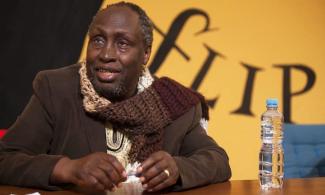
Ngugi, who now writes primarily in Gikuyu, said that literary awards are incentives given to Africans to abandon their local languages.
Kenya’s foremost writer and one of Africa’s greatest, Ngugi wa Thiong’o, has called on African countries to adopt Swahili as their official language.
He made the call during a conversation with Professor Okey Ndibe. The conversation was part of the Pan African Writers Association (PAWA) Conversation with Veteran Writers Series organised by Wale Okediran.

“English is inherently higher,” he said. “It is as if European languages can only grow in the graveyards of other languages,” he said in a virtual literary seminar that centered on the power of language.
The author of seminal novels like “A Grain of Wheat”, “Weep Not Child” and “Petals of Blood” said that “Every African child should be rooted in their mother tongue even if that language is spoken by only five people,” he said.
“An African who speaks five different languages but cannot speak an African language is a slave.”
Ngugi, who now writes primarily in Gikuyu, said that literary awards are incentives given to Africans to abandon their local languages.
“Prizes are given to African writers on the condition that they do not write in an African language,” he observed.
He called such prizes enticements to detach Africans from their languages.
In 1977, the Kenyan government imprisoned Ngugi wa Thiong ‘o for staging a play, “Ngaahika Ndeenda” which he co-wrote with Ngugi wa Mirii. However, he acknowledged that there is an improvement in the political space in Kenya such that people could speak up and not be killed, unlike when he was living in Kenya.
Ngugi wa Thiong’o said that he discovered that he had prostate cancer when he went to see an eye doctor who performed tests that showed that his PSA was high.
He said that the doctor gave him three months to live. That night, he started the first lines of his most epic of works, “Wizard of the Crow”. “It was going to be my farewell novel,” he said, “but it refused to be finished.”
According to the author, he was writing furiously to finish the work before he passed, but it took six years to finish the novel. He urged young Africans listening to him to check their PSA level annually because African men are prone to prostate cancer.
The author, whose most recent work is “The Perfect Nine: The Epic of Gikuyu and Mumbi” said this about writing, “For me, writing has always been a struggle.”
Answering a question from Nigerian writer, Rudolf Okonkwo, on how he would like to be remembered and where he would like to be buried, Ngugi expressed the hope that he would leave behind a work that would inspire the children of tomorrow.
“I will like to become part of the soil of Africa,” the award-winning writer said.